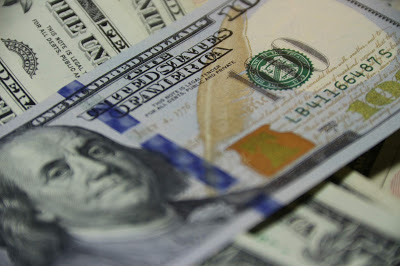The dollar has dipped by 0.2 per cent against a basket of major currencies on Thursday.
The respected currency is suffering even as a trade row between China and the United States escalates.
After a knee-jerk reaction to new tariffs announced by Washington and Beijing on Tuesday, currency markets are settling down and expecting the fallout will take some time to show up in corporate earnings and not produce a sharp global shock.
The dollar, which has tended to gain as tensions escalate between the world’s two largest economies, dipped 0.2 per cent to 94.410 , near its seven-week low of 94.308 touched on Tuesday.
Traders also noted that U.S. macro-economic data has remained strong so far despite trade disputes since early this year.
The dollar’s more risk-sensitive rivals held firmer.
Emerging-market currencies strengthened, led by the Indian rupee after China said it would not retaliate with competitive currency devaluations.
Despite its weaker tone on Wednesday, some market participants still see strength for the dollar.
“It is the champion reserve currency and it has the risk-free Fed funds rate. So the currency with the lowest risk is offering the highest yield in G10,” said Andreas Koenig global head of FX at asset manager Amundi.
“As long as this abnormality holds you can’t strategically sell the dollar.”
Investors were also awaiting next week’s Federal Reserve meeting. The U.S. central bank is expected to raise its benchmark rates and shed light on the path for future rate hikes.
Markets were closely watching a European Union summit where Prime Minister Theresa May appealed to fellow EU leaders on Wednesday to drop “unacceptable” Brexit demands that she said could rip Britain apart.
Sterling climbed 0.2 percent against the dollar, having erased most early gains after The Times reported on Wednesday that May had rejected an improved offer from the EU on the Irish border issue.
Economists expect Norway’s central bank on Thursday to deliver the first rate hike since 2011 and say the focus will be on the bank’s interest rate projections.
The Norwegian crown on Thursday approached a seven-week high versus the dollar of 8.1405 crown.
Elsewhere, the Swiss central bank is expected to leave monetary policy unchanged, with markets keeping a close eye on its assessment of the currency.
“Short term the SNB might be able to prevent franc appreciation with the help of interventions, but no doubt it would not manage to do so long term,” said Commerzbank currencies strategist Ulrich Leuchtmann.
“But the likelihood of [long-term] franc appreciation is slim because the euro zone crisis would have to boil up quite significantly for that to happen, and that seems unlikely at present,” he said.
The euro was 0.2 per cent higher against the dollar at $1.17 per cent.
The Australian dollar, a proxy for China-related trades as well as a barometer of broader risk sentiment, held at three-week highs, having gained 1.5 per cent so far this week.
It stood at $0.7268 per cent.
The yen traded at 112.23 to the dollar, staying close to a two-month low of 112.445 touched on Wednesday.
The yen has pulled back slightly this week as investors reassessed the impact of the Sino-U.S. trade war.
The New Zealand dollar jumped after data showed its economy grew at the fastest pace in two years in the second quarter.
The kiwi rose as much as 0.6 per cent to a three-week high of $0.6653 and last stood at $0.6651.





